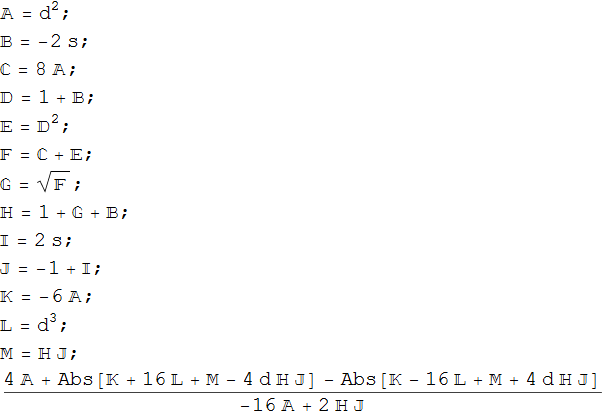I am familiar with the use of Simplify, FullSimplify, Expand, Factor, Collect and Together for simplifying a long expression in Mathematica. But recently I have encountered an expression which Mathematica doesn't simplify even though it is completely clear to my eye that the expression can be written in a much shorter form.
This is the expression:
-2 Sqrt[1/(4 + (1. - 2. s + Sqrt[
8 d^2 + (1. - 3. s) (1. - 1. s) + s^2])^2/(2 d^2))^2] -
1/4 Sqrt[(4 d^2 + (1. - 2. s + Sqrt[
8 d^2 + (1. - 3. s) (1. - 1. s) + s^2])^2 -
4 d (1. - 2. s + Sqrt[
8 d^2 + (1. - 3. s) (1. - 1. s) + s^2])^2)^2/(
d^4 (4 + (1. - 2. s + Sqrt[
8 d^2 + (1. - 3. s) (1. - 1. s) + s^2])^2/(2 d^2))^2)] +
1/4 Sqrt[(4 d^2 + (1. - 2. s + Sqrt[
8 d^2 + (1. - 3. s) (1. - 1. s) + s^2])^2 +
4 d (1. - 2. s + Sqrt[
8 d^2 + (1. - 3. s) (1. - 1. s) + s^2])^2)^2/(
d^4 (4 + (1. - 2. s + Sqrt[
8 d^2 + (1. - 3. s) (1. - 1. s) + s^2])^2/(2 d^2))^2)]
Question: How can we shorten this expression more and more with Mathematica functions. (All variables are reals)



